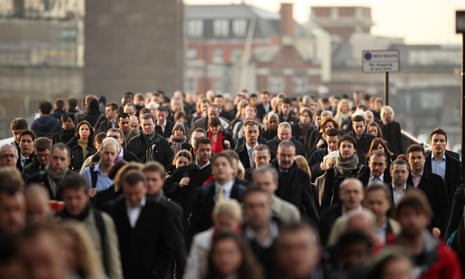British workers are taking home less in real terms than when Tony Blair won his second general election victory in 2001, with men and young people hit hardest by the wage squeeze that followed the financial crisis, according to new research.
The Institute for Fiscal Studies thinktank said wages were 1% lower in the third quarter of 2014 than in the same period 13 years earlier after taking inflation into account.
Jonathan Cribb, an author of the report, said: “Almost all groups have seen real wages fall since the recession.”
However, the study finds that women have been relatively cushioned from the worst of the wage cuts because they are more likely to be in public sector jobs, where wages fell less rapidly during the early years of the downturn.
Aided at the start of the crisis by the relative stability of public sector wages, women’s average hourly pay fell by 2.5% in real terms between 2008 and 2014, the IFS found, while men’s pay fell by 7.3%.
The IFS also singled out younger workers as among the biggest victims of the falling living standards that have become widespread in post-crash Britain. “Between 2008 and 2014, there is a clear pattern across the age spectrum, with larger falls in earnings at younger ages,” the thinktank found in a detailed study of the state of the labour market.
Labour immediately seized on the figures as evidence that Britain was trapped in a “cost of living crisis”. Rachel Reeves, the shadow work and pensions secretary, said: “This report shows David Cameron has overseen falling wages and rising insecurity in the labour market. Only Labour has a plan to tackle low pay and to earn our way to rising living standards for all.”
But the Conservatives hope that signs of momentum in wage growth will gather pace as the general election approaches. With pay rising modestly in recent months and inflation expected to dip below zero before polling day as plunging oil prices cut the price of petrol, the Tories hope the recent uptick in real wages has come just in time to stir up the feelgood factor before voters go to the polls on 7 May.
According to the latest official figures, average weekly earnings rose at an annual rate of 1.7% and the IFS suggested real incomes should continue increasing over the next 12 months.
A Treasury spokesman said: “We understand that the impact of the great recession is still being felt and so we’ve cut income tax for 26 million people, frozen fuel duty and frozen council tax. But the job is not done, which is why we must go on working through the plan that is securing a better future across the country.”
Taking a longer-term perspective, and using what it believes are the best measures of wages and inflation, which includes allowing for housing costs, the IFS said living standards remained well below their pre-crisis peak.
During the 2009-11 period, when wage declines were most pronounced, the earnings of 22- to 29-year-olds fell by 10.6%, compared with just under 7% for older age groups. Average pay for the over-60s recovered to its pre-crisis level by 2014; but it remained 9% lower than in 2008 for those aged 22 to 29.
Frances O’Grady, the general secretary of the Trade Union Congress, which has labelled the wages squeeze the longest fall in living standards since the Victorian era, said the government must do more than rely on a “lucky” run of low inflation numbers to boost salaries. “We need much stronger wage settlements and more investment in high skilled jobs and a high productivity economy,” she said.
Weaker-than-expected pay growth, even as unemployment has fallen rapidly over the past year, smaller-than-expectedpay rises have been a headache for the Treasury because income tax receipts have been lower than expected at this stage of recovery. The IFS indicated that the relative advantage gained from working in the public sector would be reversed in the years ahead because both major parties were promising to press on with public sector pay restraint.
“Private sector workers have so far experienced larger earnings falls than public sector workers, largely because of the period between the onset of recession and the beginning of the current period of public sector pay restraint in 2011. As that restraint continues, public sector earnings are likely to fall back again relative to private sector earnings,” the IFS said.
Despite the perception that the rich have emerged all but unscathed from the crisis of the past six years, the IFS said top earners had suffered larger wage cuts than their lower-paid colleagues, helping wage inequality to narrow slightly.
Gavin Kelly, the chief executive of the Resolution Foundation thinktank, said: “The UK’s six-year pay squeeze has been felt relatively evenly across the income distribution. The lowest paid have been partly protected by the minimum wage which fell by a smaller amount than wages further up the earnings scale, which helps to explain the fall in inequality.”











Comments (…)
Sign in or create your Guardian account to join the discussion